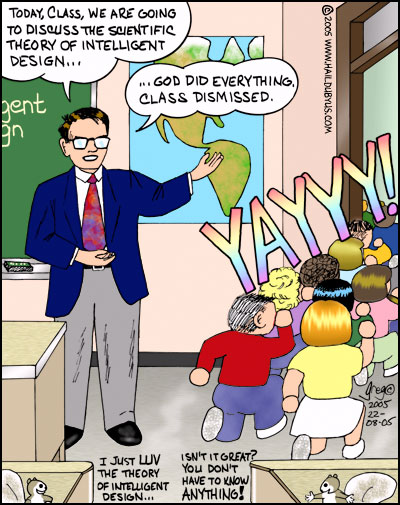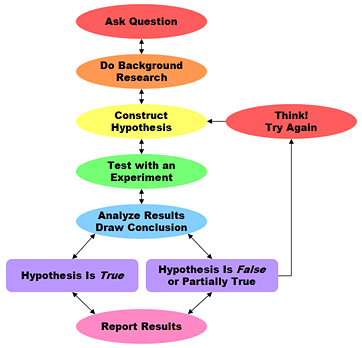[font=Impact]1.[/font]
WinePusher wrote:This will be my lst post in this thread, and it will be short cause I've already addressed these points in other posts.
Darias wrote:1.) We somewhat agree on in that you invoke ID and a supernatural repairman to explain gaps or "irreducibly complex" things, some of which have been explained already. But you still believe things evolved and that the earth is old correct?
Do you believe in any aspect of creation?
I do not believe in
Creationism, no. I also do not accept ID. Essentially, I believe in Theistic Evolution, with exception to one issue -- I do not know if God literally created the multiverse. I accept the scientific explanation that our universe was caused by pre-existing laws, like gravity. But as to whether God caused the multiverse or not -- I simply do not know, and cannot know.
It could have arose naturally, just like our universe did; however that doesn't mean God would no longer be God. Nor does it mean that He is somehow not the author of everything, if one assumes that He is omniscient and that such a quality leads to causation.
However, all of the above is completely irrelevant when it comes to life on this planet. The Theory of Evolution has nothing to do with Astronomy or Quantum Physics. When it comes to Darwinian Evolution, I accept this as biological fact. And I am not the only Christian who does. I arrived at this viewpoint at the same time when I rejected ID as 'bad science.' --
if you could even call it science at all -- let's just say its a bad idea. Francis Collins, led the Human Genome Project. He is also a Protestant fundamentalist
(and by fundamentalist he believes in literal miracles of Jesus and in the cosmological argument) He wrote a book called
The Language of God: A Scientist Presents Evidence For Belief. I read it and he shows how ID is not a science, but rather a 'Gap hypothesis.' He makes a good argument as to why ID essentially interjects "Goddidit" wherever there are gaps in the scientific record -- gaps which will ultimately be answered by naturalism.
Some have already been answered. Behe's poster child of "irreducible complexity" was totally demolished as a farce. You can watch Kenneth Miller's evidence (
He is a Theist and a Roman Catholic) in the
third video of my post
here which shows how Behe's claims of irreducible complexity are falsified with evidence.
Collins, in his book rejects ID -- and there are many Christians who do, opting instead to
accept Theistic Evolution. Billy Graham being one such individual. Now if anyone here can claim he isn't a Christian, go right ahead.
So in conclusion, one does not have to accept a literal Young earth Creationism to be saved, neither do they have to settle for Old earth Creationism -- Nor do they have to settle for the ID proposal (
a proposal because it has no models and it presents no evidence, other than claiming that gaps in the scientific record = Goddidit).
Christians can accept Darwinian Evolution and still be Christians. I don't think having to choose between
facts and salvation is much of a choice at all.
[font=Impact]2.[/font]
WinePusher wrote:Yea, I believe in descent with modification,
Me too! In that I accept that life, over millenia, adapted and changed via the process of natural selection.
[font=Impact]3.[/font]
WinePusher wrote:I believe life began by divine intervention and I believe that the process of evolution was guided by a supernatural being as convergence seems to indicate.
Oh I wholeheartedly disagree here.
Abiogenesis is a sufficient naturalistic explanation for how life arose from non-life on this earth; I see no need to interject any divine magic on God's part here. But again, Abiogenesis is technically not Evolution and we are discussing the Evolution of life.
I don't believe that Evolution was guided along by any supernatural force. Natural selection works fine by itself. In my opinion ID makes God look like a cosmic repairman, constantly fixing stuff. It makes no sense to me.
1. ID is bad science.
2. (IMO) ID makes God look bad.
Now if you care interjecting ID because there are some gaps in the fossil record, well those gaps are being filled everyday. Some creationists claim that every "missing link" that is discovered is it's own animal
(which God created at Eden) and not evidence of Evolution. Well the fact is that every "missing link" fossil that is discovered isn't supposed to be a
half bear, half duck Frankenstein -- it is supposed to be its own animal, but the qualities of such a creature in relation to other known creatures, often point to some sort of common ancestral link.
[font=Impact]4.[/font]
WinePusher wrote:I reject catastrophism and other explanations like a Global Flood for the state the fossil record is in and the the current geological aspects of the Earth.
I reject the belief in a global flood because such large amounts of water have never been on the earth, and wind does not dissolve water.
However I believe that the flood myths found in ancient Sumerian, Greek, and Hebrew cultures probably originate from a literal, regional flood -- perhaps the flooding of the Mediterranean valley, or the Persian Gulf, after the last Ice Age. I don't think the flood story is based upon nothing, especially when so many cultures espouse some sort of major flood myth -- even ones who've lived in regions that are in no danger of flooding.
[font=Impact]5.[/font]
WinePusher wrote:I also buy alot of the Creationist talking points.
Well a lot of IDers do...
[font=Impact]6.[/font]
WinePusher wrote:IYes, I agree largely with Behe's peer reviewed research on Irreducible complexity when it relates to structures such as the locomotive flagella
The video I mentioned above, as well as the
NOVA documentary show why the locomotive flagella, once the poster child of irreducible complexity, is now a very bad example of Behe's hypothesis -- based on the fact that if you take parts away from the flagella, they still have a function.
[font=Impact]7.[/font]
WinePusher wrote:but reject the creationist point that the eye is irreducibly complex and could not have evolved.
Great, we are in agreement then. I concur that the eye is a very highly adapted and evolved organ -- despite being imperfect, due to the fact that
parts of it are "backwards". Yes the eye could have evolved on its own without divine intervention.
[font=Impact]8.[/font]
WinePusher wrote:Other creationist points I wholeheartedly accept are:
Distinctions between Microevolution and Macroevolution
In science, there is no real distinction between the two.
The terms have been wrongly understood by Creationists who don't like the idea of accepting the fact that one species can evolve into another.
[font=Impact]9.[/font]
WinePusher wrote:A lack of numerous transitional fossils in relation to the entirety of the record
There will always be a lack or a gap, we can minimize gaps with new discoveries, but such evidence will never satisfy some people. Today's gap is tomorrow's bridge. There's no reason to hinge God's existence on the fact that we haven't discovered a seamless assemblage of fossils from the bottom up.
[font=Impact]10.[/font]
WinePusher wrote:The failure of Evolutionary Gradualism has an adequate explanation for the Cambrian Explosion
Natural explanations are all we have for the Cambrian Explosion; you offer no other model aside from we're not completely sure, ergo
"Goddidit".
[font=Impact]11.[/font]
WinePusher wrote:The creation of the universe from an omnipotent and supernatural first cause
Our universe was created because of gravity, and gravity and time was pre-existing
because of the existence of the Multiverse.
I'm not a scientist, so anyone who knows more about astronomy can feel free to correct me if I'm wrong.
[font=Impact]12.[/font]
WinePusher wrote:The fine tuning of the universe for intelligent life from a rational and omniscient designer
ID doesn't present the case for a good designer, but rather a repairman who fixes stuff that wasn't so great to begin with. We have vestigial organs and imperfect eyes and stuff one would expect if evolution is indeed a blind phenomenon of natural selection. Saying that creation isn't perfect because "sindidit" is a wild claim given the simple alternative --
scientific naturalism.
[font=Impact]13.[/font]
WinePusher wrote:The improbability of there being enough beneficial mutations to a genome. Refer to Haldane, Specified Complexity and No Free Lunches
Time of course is on our side; mutations that were to a species advantage AND which were passed on, helped the species survive -- whilst the species which did not have those mutations became less frequent in the population.
Some mutations are both good and bad, Sickle Cell trait for example. The disease can be lethal, but if you have the traits, it protects you from Malaria.
[center]

[/center]
There are of course other mutations that had no real "purpose" -- the mutation responsible for turning off part of the gene responsible for melanin -- it created blue eyes, brown and blond hair, and also albinism.
[font=Impact]14.[/font]
WinePusher wrote:The failure to produce a consistent model of Evolutionary rates
Well
rates would vary, species evolve and adapt to their habitat, some species may experience less change over time than others.
Speaking of
inability to produce models -- what models does ID present? None whatsoever -- another reason not to call it "science."
About.com wrote:Under cross examination, ID proponent Michael Behe, a biochemist at Lehigh University in Bethlehem, Pennsylvania, admitted his definition of “theory� was so broad it would also include astrology.
_____
SOURCE

 [/center]
[/center] [/center]
[/center] [/center]
[/center] [/center]
[/center] [/center]
[/center] [/center]
[/center]
